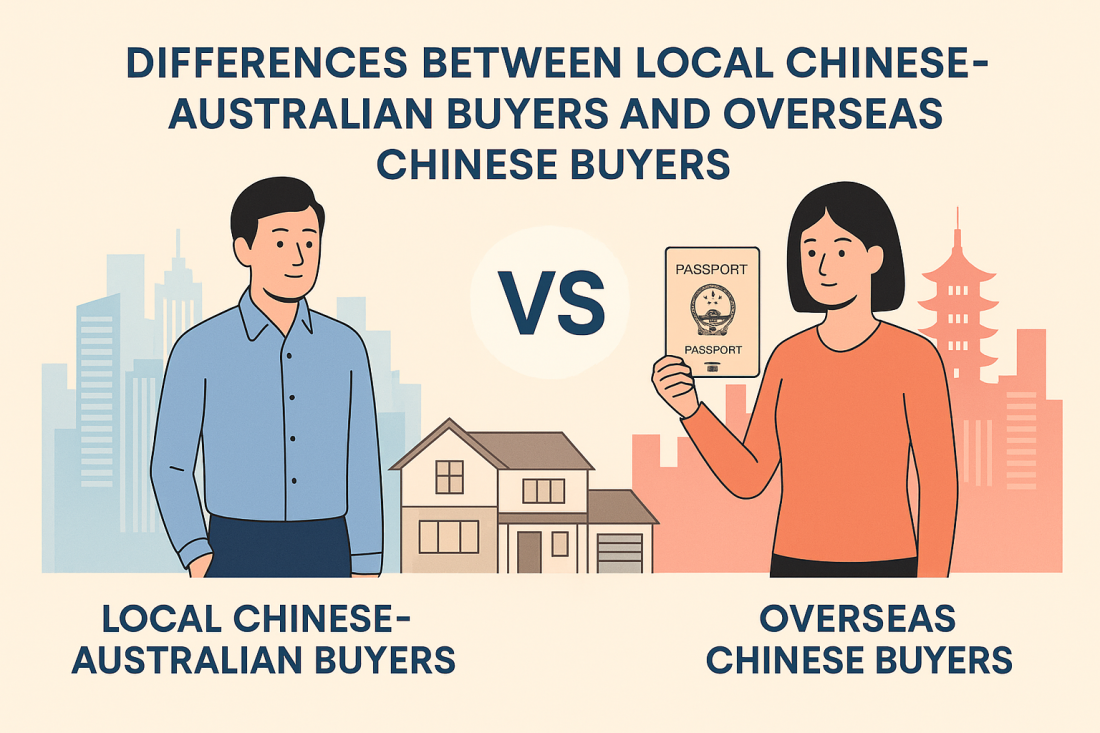Explainer: Differences Between Local Chinese-Australian Buyers and Overseas Chinese Buyers
Australia has long been a popular destination for Chinese property buyers. However, within this group, it’s important to distinguish between local Chinese-Australian buyers and overseas Chinese buyers. While they share cultural roots, their purchasing behaviours, preferences, and motivations can be very different. Understanding these differences can help developers, agents, and marketers tailor their strategies more effectively.
- Residency and Financing
Local Chinese-Australian Buyers:
These are Australian citizens or permanent residents of Chinese descent. They often have easier access to local bank financing, enjoy better mortgage rates, and aren’t subject to FIRB (Foreign Investment Review Board) restrictions.
Note: For some local Chinese buyers, funding for property purchases may still come from overseas sources, such as financial support from family members.
Overseas Chinese Buyers:
Typically living in China, Hong Kong, Singapore, or Malaysia, these buyers often face stricter FIRB regulations. They usually purchase new properties only and may pay higher stamp duties and taxes as foreign investors. Financing can also be more complicated, with many relying on overseas bank loans or cash purchases.
- Buying Motivations
Local Buyers:
Local Chinese buyers often purchase homes for personal use or long-term investment. Family needs, access to good schools, public transport, and proximity to the CBD or established Chinese communities (like Box Hill, Chatswood, or Sunnybank) are major factors.
Overseas Buyers:
Many overseas buyers are motivated by asset diversification, education plans for their children, migration planning, or wealth preservation. They might buy apartments near universities (like Melbourne University or UNSW) even before a visa is granted.
- Property Preferences
Local Buyers:
Tend to prefer larger properties such as houses or townhouses in suburban areas. Land size, growth potential, and lifestyle factors are crucial. They might be open to established homes.
Overseas Buyers:
Often look for brand-new apartments or off-the-plan projects because of FIRB rules. Location near major universities, city centres, and iconic landmarks matters more than land size.
- Decision-making Process
Local Buyers:
The decision-making process is generally faster. They can easily attend inspections, auctions, and engage directly with agents. They’re also likely to rely on local property data and reports.
Overseas Buyers:
Purchases are often heavily influenced by family, friends, or trusted migration and real estate advisors. Buying decisions might take longer due to distance, legal requirements, and the need for additional assurance.
- Marketing Strategies to Reach Each Group
Local Chinese Buyers:
- Advertise through local Chinese media (e.g., ACproperty.com.au, Chinese papers etc).
- Highlight proximity to schools, lifestyle, community amenities.
- Promote auctions and private inspections in Mandarin.
Overseas Chinese Buyers:
- Focus marketing efforts on online platforms popular in China, like WeChat, Weibo, Baidu, and Little Red Book.
- ACproperty.com.au also publishes your listings on top Chinese portals like Fang.com
- Emphasize investment potential, rental returns, and visa-related advantages.
- Offer virtual tours, bilingual contracts, and trusted local partnerships.
Recognizing the differences between local Chinese-Australian and overseas Chinese buyers is key to successful engagement. By understanding their motivations, challenges, and communication styles, property marketers and agents can build more targeted and effective strategies, leading to stronger relationships and better sales outcomes.
At ACproperty.com.au, we help real estate agencies tailor their marketing to both local and overseas Chinese audiences, maximising exposure and driving real results.



